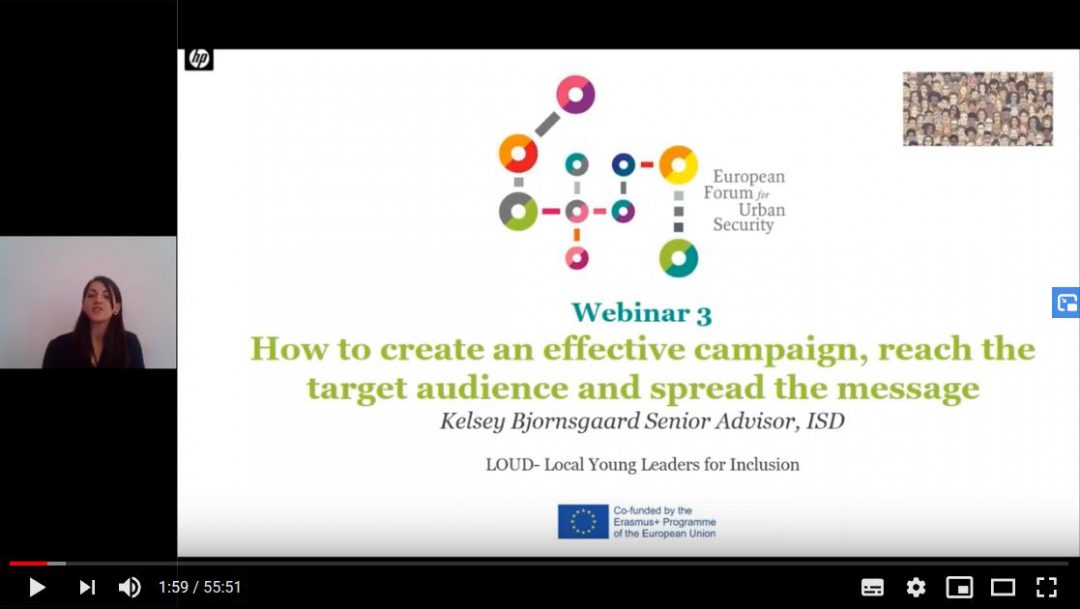May 2021 – The LOUD (Local Young Leaders for Inclusion) project led by Efus organised its final conference (online) on 26 May, concluding more than two years of work during which the nine participating cities mobilised young local citizens to design and produce alternative narrative campaigns promoting tolerance and countering discrimination and hate speech.
Gathering, besides the project’s consortium, representatives of other local and regional authorities as well as urban security professionals, the event highlighted Efus’ long-term commitment to combat discriminatory violence as a way of preventing escalation into polarisation or violent extremisms and resonated with Efus’ belief, based on the experience of member local and regional authorities, that in order to respond to such challenges, the participation of citizens – and of young people in particular – is essential.
How can local authorities involve young people in the fight against discrimination, intolerance and radicalisation?
The conference opened with a round-table discussion chaired by Efus Executive Director Elizabeth Johnston on how local authorities can involve local young people in the fight against discrimination, intolerance and extremism. Through the LOUD project, nine European local authorities mobilised, trained and supported local young people so they could design and produce alternative narrative campaigns. These campaigns, which you can watch here, were broadcast online.
Three speakers intervened in this session, two of which were partners in the project: the Belgian City of Leuven, represented by its Mayor, Mohamed Ridouani, and the French City of Montreuil, represented by Deputy Mayor Loline Bertin. The third speaker was a representative of the French Interministerial Delegation for the Fight Against Racism, Anti-Semitism, and LGBT Hate (Délégation Interministérielle à la Lutte Contre le Racisme, l’Antisémitisme et la Haine anti-LGBT, DILCRAH), Shani Benoualid, Advisor for Digital and Social Networks.
Key takeaways from the round-table session
- Measures to counter discrimination should be included in the local urban security measures of municipal and regional authorities.
- It is important to involve young people in the design and implementation of measures and projects to combat discriminatory violence, polarisation and hate speech. Young people are well placed to influence their peers and may provide valuable understanding and perspectives, particularly when it comes to the virtual sphere.
- Inclusion is best established at the local level through community initiatives involving young people, peers and neighbours.
- Further work is needed – with the help of young people – to address the problems of dangerous discourses arising in the online space.
- Discrimination cannot be tackled if it is not understood: education and awareness raising are essential aspects of prevention and community empowerment in the fight against discrimination.
- It is important to empower young people to see themselves as active citizens both on- and off-line and recognise their capabilities and responsibilities in the fight against discriminatory violence.
Taking stock of the local LOUD projects
Following the round-table discussion, five parallel sessions gave insight on the project’s outcomes. Each project partner city presented their campaign and how it was created, from a local audit to determine which topics needed tackling to the training given to local young people with the help of the LOUD experts and partner organisations, and the design and broadcast of the campaigns. Each in their own way, the campaigns focused on the topics of racism, discrimination, exclusion, inequality and fake news.
The partner cities all emphasised the LOUD’s benefits go beyond the project itself :
City of Pella:
“The LOUD project is a case study for my city. It taught us how to cooperate with new partners.”
City of Leuven:
“The LOUD project taught us to understand that diversity is an opportunity and not a problem.”
City of Düsseldorf:
“The end of LOUD is not the end of the project. All the tools produced will be used as material to promote dialogue and raise awareness in schools.”
City of L’Hospitalet:
“LOUD will continue and is now part of our city’s strategy for the prevention of radicalisation.”
City of Rosny-sous-Bois:
“The video produced by the youngsters is a way for us of keeping the LOUD project alive, of promoting partnerships with local actors and the work of young people. It is also a reminder of the need to raise awareness of discrimination.”
The presentations by the partner cities were followed by a general discussion on the impact on the campaign and the lessons learned that can be helpful for other local or regional authorities wishing to initiate a similar project or improve existing schemes. Practical recommendations will be included in the project’s final publication, which will be available in the coming weeks.
> We strongly encourage you to take a few minutes and check out the nine campaigns here! We are very proud of the work done by the local young citizens of the LOUD partner cities: creative, original and impactful, their campaigns are well worth a look.
> More information on the LOUD project





